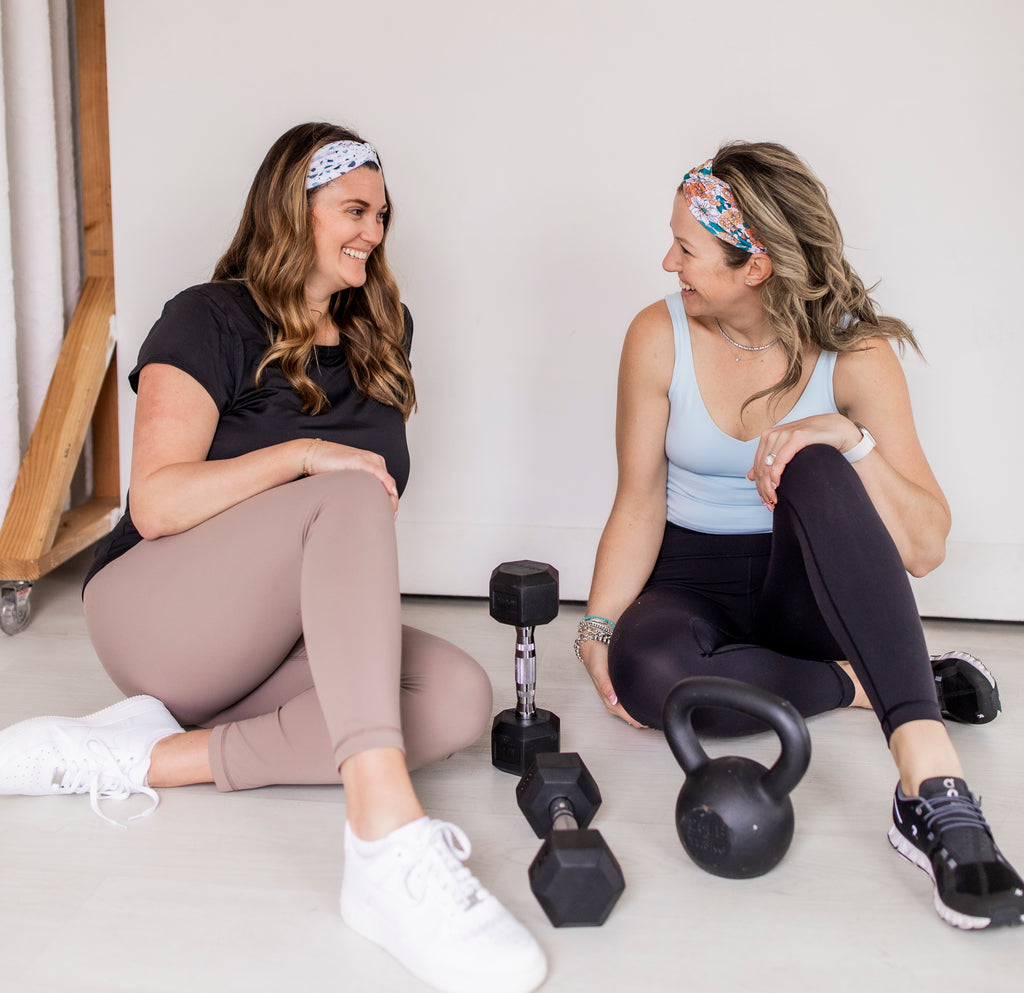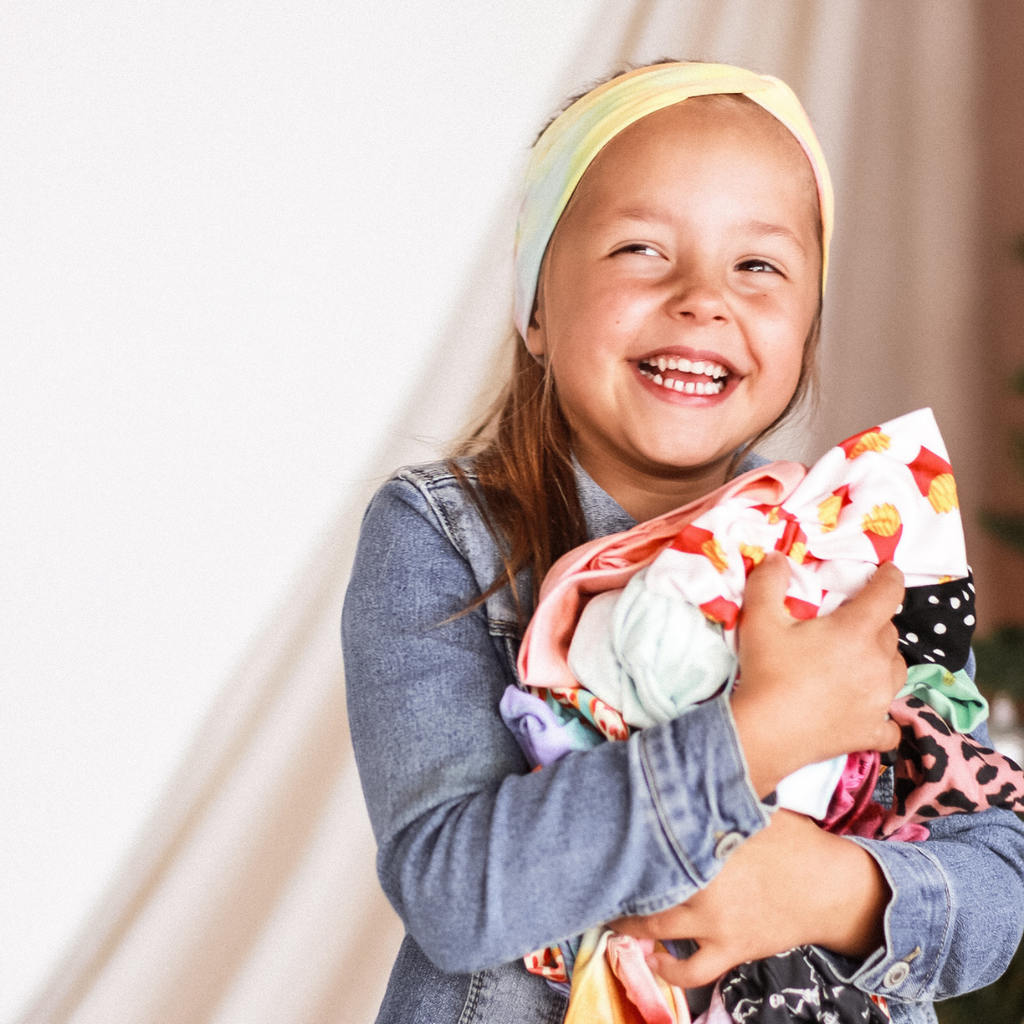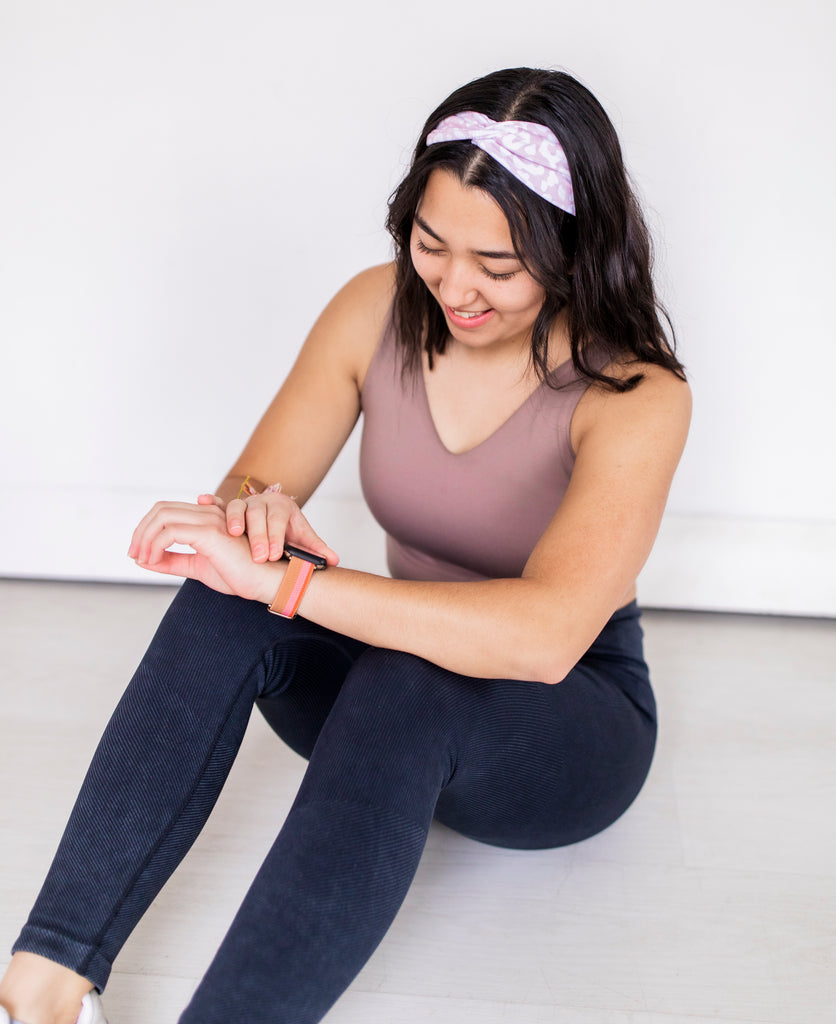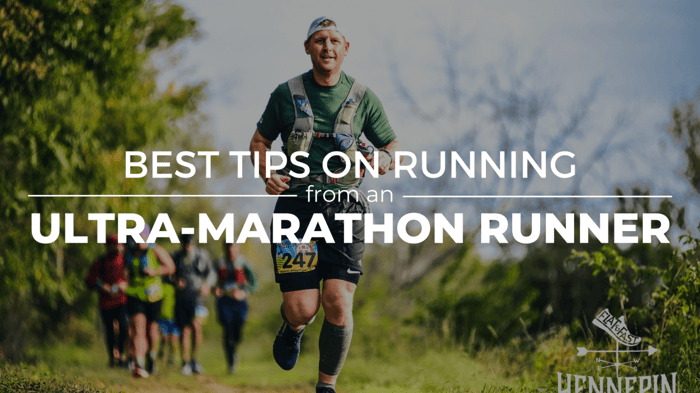Here at Lilac Market, we love (and admire) our runners for their stamina, energy and drive to keep going. We got the amazing opportunity to talk to one runner in particular, who gave us some of his strategies on how he stays focused, even in the cold.
You've decided this is the year - you're ready to run! But how do you stay motivated, on track, and more importantly warm during these winter months? We spoke with Spencer (father to the very special Tess, who you may remember from our previous Lilac Market Spotlight), an ultra-marathon runner who's been through every stage of the running game. Keep reading for advice straight from a pro!
Hi, Spencer! Tell us: who are you, where are you from and what do you do?:
I’m Spencer, and I’ve been married to my wife Libby for 19 years. We have 3 daughters in high school and one son. We live on a family farmstead in Central Illinois, and the house is about 150 years old, so maintenance on the farm is a full-time job. We have 3 Labrador Retrievers, a lot of cats and chickens. I also work for a manufacturer of mining and construction equipment as a supply manager. I’ve done multiple ultra-marathons, have run the St. Jude Runs events for many years, and participated in numerous other events.
What first got you into running and how has it evolved since you’ve started?:
I grew up on a small farm myself and was always active or playing sports, it’s just something you did. I joined the Army Reserve once I graduated, and became an infantryman and a drill sergeant. I remember loving the Olympics, and I always enjoyed running in particular. Up until 2008, there was always a reason to train, mostly for competitions or for a certain goal. I didn’t have a New Year’s resolution, I’ve just always enjoyed moving.
How did you start with ultra-marathons and how many have you participated in?:
I got into ultras after getting out of the Army in 2008. I didn’t have the drive to compete with running after that, but I did enjoy doing really tough stuff that tested you. We’re lucky to have a decent running community here, and running in the woods sounded refreshing and would fill that void left from the military. It was much longer distances, which was more of a challenge to figure out. How the heck do I even run 50 miles? It intrigued me and pulled me right in. I enjoyed the community so much that I kept with it!
From what I tallied up, I’ve completed 22 100-mile runs, and DNF’d (did not finish) 16 100-mile runs. I’ve done probably about 30 other ultra distance events, with shorter mileage. My best time was 23 and a half hours, but I’m usually around 28.
When was your first St. Jude run?:
We got introduced to St Jude Research Hospital in January of 2009. Our kids were all pretty little when our daughter Tess got diagnosed with stage 4 high-risk neuroblastoma, with a 25% chance of living. We were fortunate enough to get partnered with St. Jude in her treatment. They were miraculous, I wouldn’t take my kid anywhere else. They have amazing research, and they share all of their breakthroughs globally and freely. Tess had a chance to survive because of their expertise. But even if she hadn’t, other children would live because of what they learned from her experience through research.
We live close to Peoria, where the first affiliate St. Jude clinic is located. We had lived in Illinois for several years before we first heard about the run, but hadn’t participated in it. Then we were walking through the doors of St Jude ourselves. We went through a year of treatment, and after Tess did very well and actually went into remission, I promised myself “I’m going to do that run.”
That was my first St. Jude Run. The run has about 30 different cities that all have groups of people that leave at different times, then arrive in Peoria around the same time, which leads into a telethon that we do. I wanted to do the Memphis-to-Peoria route because it’s 465 miles, it’s 4 days, you get to go to the hospital, and it was the original route that started it all in 1982. There are a handful of survivors that do the event, including a lot of parents. It’s a lot of logistics, but it’s fun.
The key memory for me at that first run came when I was running at night on the shoulder of the road. It hit me that people had been doing this for over 30 years on the same pavement I was on at that moment to raise money. That money helped save my daughter. 12 years later, every year since Tess’ remission, I’m still running them and doing additional work with the run itself. Tess actually signed up for the run herself last year, and we’ll be doing it together in 2022!
How difficult is the St. Jude Run?:
Compared to other things I’ve done, it’s not as difficult. It’s not a race, the running side is not difficult. There’s a lot of sleep deprivation; you’re running in the morning, afternoon and night. But something anyone can always lean on is the individual St Jude experiences. The spirit and grit of those kids is all the inspiration anyone needs. They didn’t do anything wrong, but they still got cancer. But if you look at them, they’re not down and out. They wake up, handle the day, and are tough. When you’re running the miles, it’s easy to lean on that and think, “what in the world do I have to complain about?” It’s not about comparison, it’s recognizing if you’re out on the road, whether you’re fast or slow, it’s all relative. Just keep going. You’ve already succeeded if you’ve gone out on the road and you’ve got your shoes on. Just like those kids, take it one step at a time.
What would you say was your biggest challenge or accomplishment for your runs?:
The coolest 100-mile ultra that I did was in Minnesota, called the Superior Sawtooth 100. You had some crazy elevation, a 36-hour cutoff, and a 50% finish-rate on average. It was going to be a tough one. I carpooled with people I didn’t know as a ride along. These guys were all in a Chicago running group, and of course we talked on the way up there. What was so meaningful about that race is that out of the 5 of us, I finished the race, but at different times in the race as they dropped out, they kept following me in their cars to the aid stations. Each of them helped me in unique ways, and I wouldn’t have completed it without them. We all had one thing in common: our joy of running, ultras and helping people finish. I felt like I shared my award with them, and that moment of overcoming along with their support was huge.
Do you think running has helped you to feel confident to do other difficult challenges, and not just with running?: For sure, especially the length of the races. The sheer numbers can be really intimidating to people. I tried a 200 mile race where I went for 48 hours straight. But now, I have that experience that I can draw on because of that ability to endure that I can take with me into other events.
How do you combat that inner negative voice that says “I can’t”?:
In the beginning, the difficult part of training was managing my own expectations for the outcomes and my performance. My expectations would be really high. I’ve been passed in races by incredibly strong people with their own stories: once a woman pushing a double stroller in a 5k, and a double amputee in an Army race. We all come from different starting spots, and was a big deal for me.
How did you incorporate that mindset around healthy movement with your family?:
With my kids, I wanted them to run and be healthy, so I would bring them with me to train. “You don’t have to run,” I would say, “but bring your bike.” Because they might think it’s cool if they actually saw me doing it, and if they’re out there with me they’re more likely to do something. If they can run with me, that’s just starting them down a good path. Include them in whatever you do.
What’s your current training strategy?:
It kinda stinks right now. I’m a binge runner; I go through periods of time where I don’t do a whole lot, and then other times I sign up for a race and get really focused on preparing for it.
30 hours is the cutoff for 100-mile races, and I’m usually right at 28 hours, so I always make finishing ugly. So that's my goal right now. What I’m trying to do now is go out there for an hour 3 or 4 times a week, and if I’m lucky get a 10 or 20 mile run done on the weekend. I don't always meet that goal - maybe 60% of the time I can stick with it - but I don't stop trying to make it a priority.
There are a lot of people who have running as their New Year’s resolution. What advice would you give to those just starting out?:
You have to have your "Why". For me, there’s things I want to still be able to do when I’m 80 years old, keeping that strength and ability to function. Overall whole-body health is what’s currently driving me to do that. When Tess was sick, my Dad was also sick, and he didn’t make it. The thing that connected me, especially during the St. Jude run, was thinking that this is the closest I can get physically to feeling how they felt during their personal journeys. Keeping them close to me in my head gave me another reason to take that next step.
But your Why has to be meaningful in order for you to commit. If you really want to run, sign up for a race. Find a race that’s 3-6 months out from now. Put something big on the calendar, because then you can commit to that. Look for a couple smaller events or races that can help build you up, like a 5k, then a 10k. With your Why, you can commit to a goal (a race), then break down your training from there to accomplish it.
And stay realistic. Figure out how to stay in your feet for 45 minutes, things like that. That will be a quick win that will keep you going to sign up for the next bigger thing. Use the snowball effect to get the momentum going for future runs.
Focus on something you can accomplish in small steps, like just building the habit of getting out there regularly. For people starting out, it could be as easy as starting out walking while listening to a podcast. Take one thing to figure out, like doing a push up correctly, focus on progress and don't be ashamed of where you’re at now.
Don’t get discouraged if you build the perfect plan and you can’t hold to it. Change and variation is good, and especially for most of us who aren’t sponsored by Nike, this isn’t our career. Even if you can’t do it day in and out, you’re still doing pretty good. Don’t let a bad week keep you from doing what you need to in order to accomplish your goal.
I recommend running through nature, especially if you have a hard time focusing. If I’m just running down main street, that seems boring to me. Try to find a trail or park where you can be in trees and fresh air, that's much more interesting. Plus, if you're going to run, you need the practice of being out in the elements anyway, even if it's a paved trail. I prefer when the scenery isn’t the same.
Having a partner to team up with sure does help for motivation! Support is super important, and many friends have helped me to complete many runs. There’s an individual aspect where you can’t care about where you’re at in relation to anyone else, but there’s also a community part that really keeps you going, and is vital to this being a lifestyle rather than a one-and-done. If you really want to run, usually it’s because you enjoy it. If it’s not fun, you won’t do it.
Now that cold weather has hit, what's your best tips for winter running?:
If you’re running in the winter, start to enjoy the fresh air. You can see some pretty amazing scenery when you’re out in nature in the winter, too. Whether it’s the grind of life or kids, make time for you, whatever the season is.
My main tip: Dress in layers, stuff that breathes so the sweat doesn’t turn cold. There’s no bad weather, just improper gear. Modify your training plan for the weather; maybe you shorten the time or the mileage. Try a lot of different things and strategies - go out for a little bit and start figuring it out. If you screw it up, learn from it and change it on the next run.
Enjoy yourself, even if it’s a short run - you’re outside!
 What’s your personal plan for the upcoming year?:
What’s your personal plan for the upcoming year?:
I do several local events every year in the community I'm in, but something I did last year that I didn't think I'd love was the MURPH workout last Memorial Day (thanks to Kelsey!). It was out of the blue and so much fun, I really enjoyed it. So this year, I'll be training for that and doing a couple of other long distance obstacle events, similar to a tough mudder and a Spartan-type race. One of the events will be 12 hours, the other a 36 hour event. It'll be a combination of farm-style movements, and I’m excited to try new challenges.
 If you could offer some practical advice to leave our readers with, what would it be?:
If you could offer some practical advice to leave our readers with, what would it be?:
Once you have your Why, write it down where you can see it, on a mirror or by your closet. Since I’ve been working from home, having it on my computer helps me get things done so I can do my Why. Constant reminders help.
And delete half the apps on your phone. Period.

To hear the story first-hand from Libby, watch their St. Jude Patient story here.
Keep up to date on all of our posts and news by signing up for our email list here!
Show us how you're styling all your Lilac Market Headbands!
Tag @lilacmarketheadbands & #lilacmarketheadbands on Instagram for a chance to be featured on our social channels.
- Tips for runners
- Running in winter
- Best running tips
- Ultra-marathon
- Winter training
- Cardio training tips
- Non-slip headband
- St Jude
- St Jude Lilac Market Headbands
- St Jude Headband
- Best headband for running



















